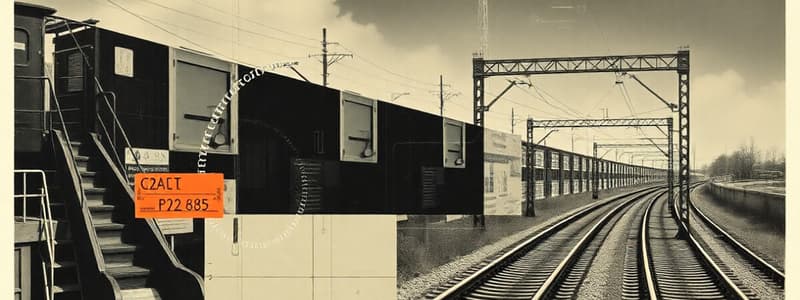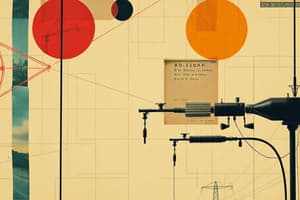Podcast
Questions and Answers
What is the nominal gain of the amplifier in the Amplifier-Equaliser system?
What is the nominal gain of the amplifier in the Amplifier-Equaliser system?
- 20 dB ±1 dB (correct)
- 15 dB ±1 dB
- 10 dB ±1 dB
- 25 dB ±1 dB
What is the input impedance of the VF Amplifier?
What is the input impedance of the VF Amplifier?
- 750 Ohm ±10%
- 350 Ohm ±10%
- 470 Ohm ±10% (correct)
- 600 Ohm ±10%
What type of protection must the power supply unit have?
What type of protection must the power supply unit have?
- Short-circuit protection (correct)
- Fuse protection
- Voltage regulation protection
- Surge protection
What is the maximum harmonic distortion at 1 KHz when the amplifier is set to maximum gain?
What is the maximum harmonic distortion at 1 KHz when the amplifier is set to maximum gain?
Which parameter is critical for measuring cross talk in the amplifier system?
Which parameter is critical for measuring cross talk in the amplifier system?
How long must the batteries be capable of operating the equipment?
How long must the batteries be capable of operating the equipment?
What range of output is permitted before the amplifier is considered overloaded?
What range of output is permitted before the amplifier is considered overloaded?
What is the minimum capacity required for each battery?
What is the minimum capacity required for each battery?
What type of intercom facility is provided at each station?
What type of intercom facility is provided at each station?
What is the power supply requirement for the Amplifier-Equaliser equipment to operate normally?
What is the power supply requirement for the Amplifier-Equaliser equipment to operate normally?
What frequency range is the Equaliser response variable slope specified in?
What frequency range is the Equaliser response variable slope specified in?
What is the loop resistance capacity for extending the intercom telephones?
What is the loop resistance capacity for extending the intercom telephones?
Which of the following is NOT a component of the complete system in the Amplifier-Equaliser setup?
Which of the following is NOT a component of the complete system in the Amplifier-Equaliser setup?
What feature allows the controller to communicate with a subscriber even when their phone is off-hook?
What feature allows the controller to communicate with a subscriber even when their phone is off-hook?
Which function is not part of the remote monitoring facility?
Which function is not part of the remote monitoring facility?
What is one capability provided by the intercom design for subscriber communication?
What is one capability provided by the intercom design for subscriber communication?
Flashcards
Amplifier-Equaliser System
Amplifier-Equaliser System
A system used in communication networks to amplify and equalize voice frequency (VF) signals, ensuring clear communication over long distances.
Quad Cable
Quad Cable
A type of cable used for transmitting VF signals, typically containing four individual conductors.
End/Mid Station Patching
End/Mid Station Patching
A technique that allows switching between different paths in a communication system, providing redundancy and fault tolerance.
VF Amplifier Input Impendence
VF Amplifier Input Impendence
Signup and view all the flashcards
Amplifier Gain
Amplifier Gain
Signup and view all the flashcards
Frequency Response
Frequency Response
Signup and view all the flashcards
Cross Talk
Cross Talk
Signup and view all the flashcards
Equaliser Response
Equaliser Response
Signup and view all the flashcards
Short-circuit Protection
Short-circuit Protection
Signup and view all the flashcards
Battery Bypass
Battery Bypass
Signup and view all the flashcards
Battery Capacity
Battery Capacity
Signup and view all the flashcards
Intercom Facility
Intercom Facility
Signup and view all the flashcards
Intercom Dialing
Intercom Dialing
Signup and view all the flashcards
Intercom Privacy
Intercom Privacy
Signup and view all the flashcards
Subscriber Call Restrictions
Subscriber Call Restrictions
Signup and view all the flashcards
Remote Monitoring Facility
Remote Monitoring Facility
Signup and view all the flashcards
Study Notes
Quad Cable Based Control Communication System
- Indian Railways uses optical fiber cable (OFC) and six quad jelly-filled cables on important routes. On less important routes, only quad cables are used.
- Control communication on OFC uses STM-1/IP-MPLS router and P.D.MUX equipment at stations. Block circuits, emergency sockets, and level crossing gates are communicated via quad cable.
- If OFC cable installation is pending, control and block communication relies solely on the quad cable.
- The Amplifier-Equaliser system allows communication at each station without needing to load the quad cable.
- Each station needs amplifier-equaliser equipment to compensate for signal losses across the VF band.
- The system includes cable termination, distribution, and monitoring panels, 'U' link panels, equaliser amplifiers, and VF transformer panels with decoder and other printed circuit boards (PCBs).
Electrical Parameters
- Input impedance for the VF amplifier is 470 ohms ±10%.
- Nominal gain at 1kHz is 20 dB ±1 dB.
- Frequency from 300 Hz to 3.4 kHz has a ±3 dB flat response.
- Input signal minimum is -20 dBm, and output is 0 dBm with amplifier gain.
- Cross-talk level between adjacent quads must be better than -60dB at 1kHz.
- Equaliser response must vary between 0 dB and 12 dB for 300 Hz to 3.4 kHz with no distortion (3%) at maximum gain.
Power Supply Requirements
- The Amplifier-Equaliser equipment typically operates at 230V AC, with a variation range of 160V to 270V.
- Systems can switch to solar power automatically.
- The power supply is duplicated, including batteries, with short-circuit protection and voltage protection.
- The system allows for by-passing of way station equipment if battery voltage drops below the required threshold level.
- Two low-maintenance 12V batteries with a capacity of 40Ah are required, sufficient for 72 hours of operation.
Intercom Facility
- Stations have 8-way intercom with dialing functionality.
- Separate cards are provided for 8-way intercom for each station.
- Extension up to 300 Ohms loop resistance is possible.
- Intercom circuit design allows for all subscribers to communicate without interrupting the controller.
Remote Monitoring Facility
- The system allows for remote monitoring and fault localization.
- Separate monitoring is provided for sectional, deputy and S&T control circuits.
- Remote monitoring allows functions such as disconnecting circuit cards or cutting buffers, changing battery, monitoring voltages, and status (e.g., AC fuse).
- The Remote Card automatically sends fuse failure alerts with its identity to the test room.
- Authorization codes, password, or keys are needed for disabling/enabling command codes to prevent unauthorized activity.
Earthing
- All non-current carrying metal parts of the amplifier/equaliser and the quad cable sheath are bonded together and grounded.
Maintenance Schedule
- A detailed schedule for equipment maintenance is provided, listing frequencies and responsibilities for various technicians like Telecom Technician, Junior Engineer, and Senior Section Engineers.
- This includes checking voltage, card positioning, circuit functioning, and line-up for the equipment and Batteries.
Studying That Suits You
Use AI to generate personalized quizzes and flashcards to suit your learning preferences.




